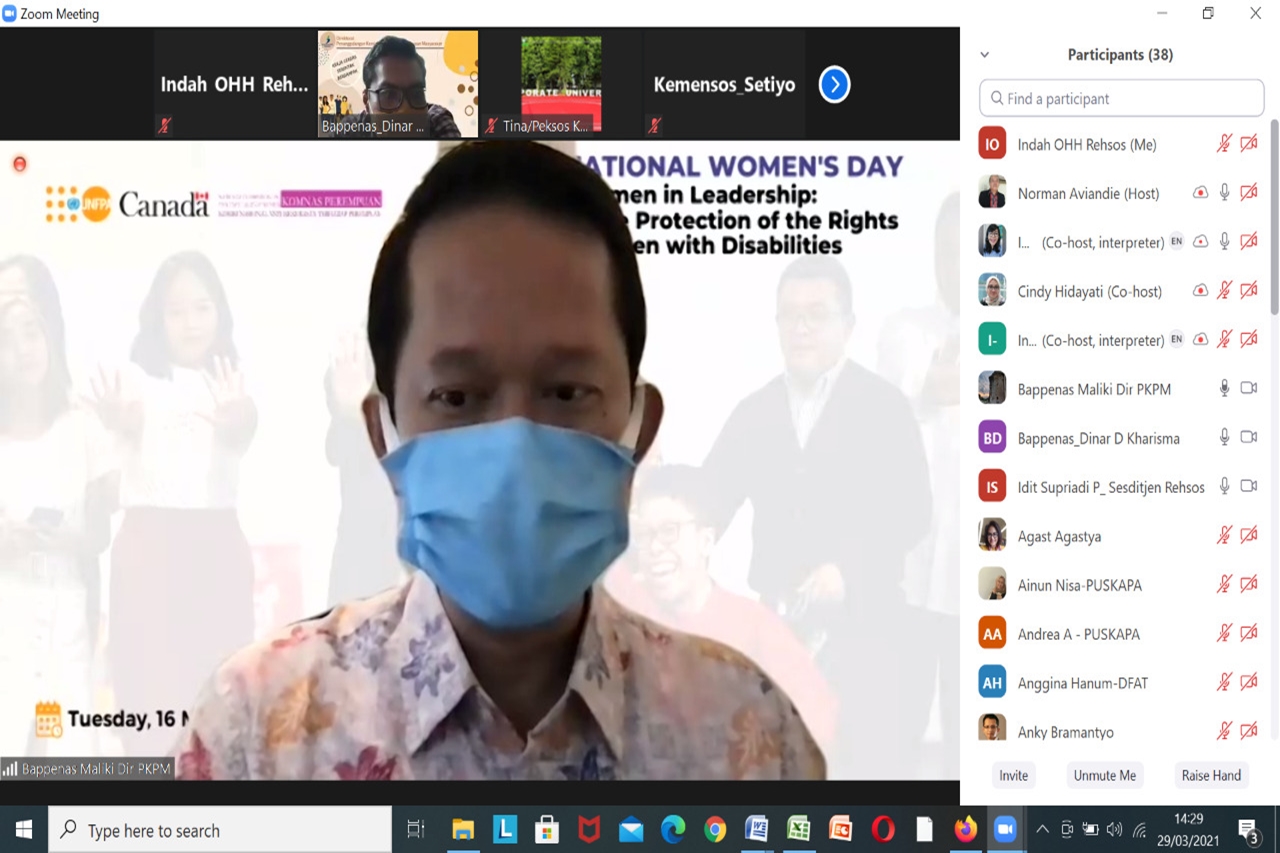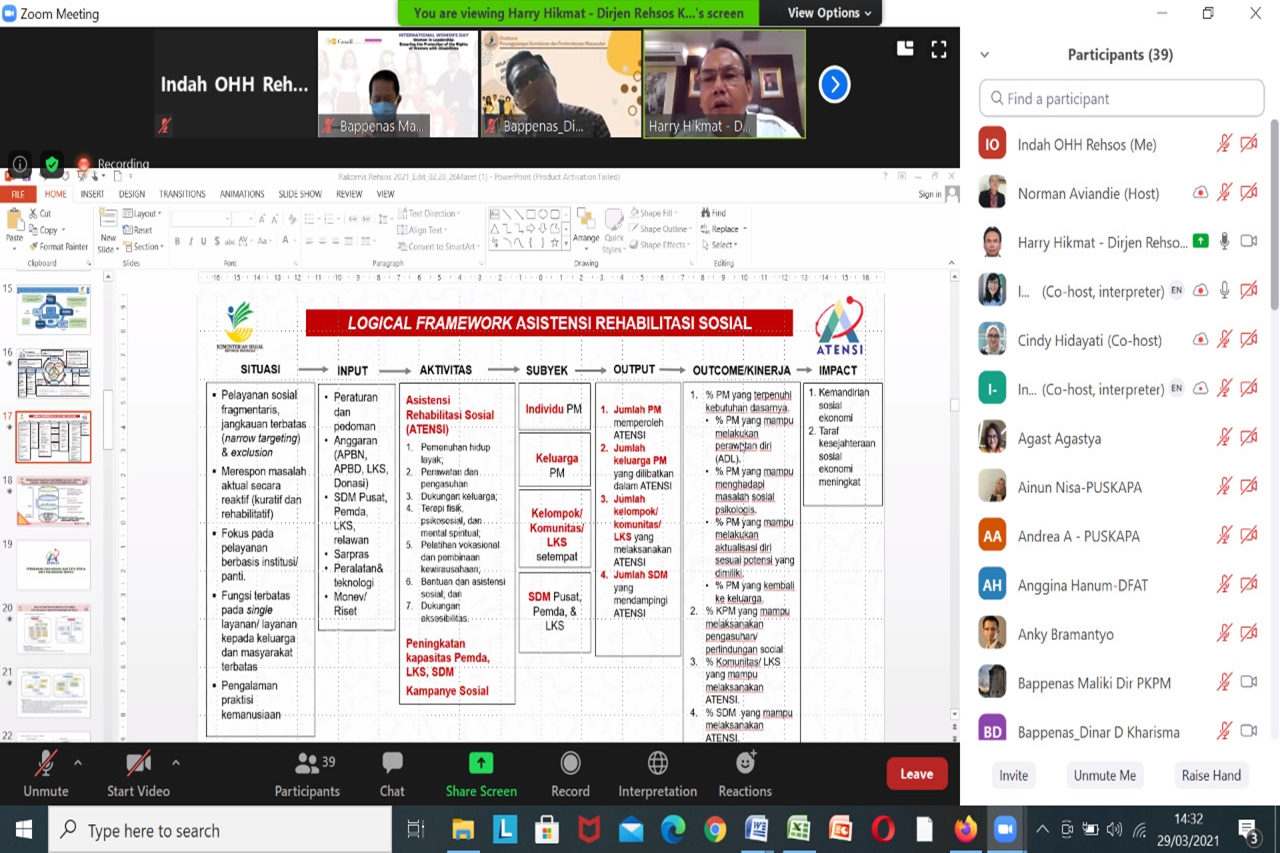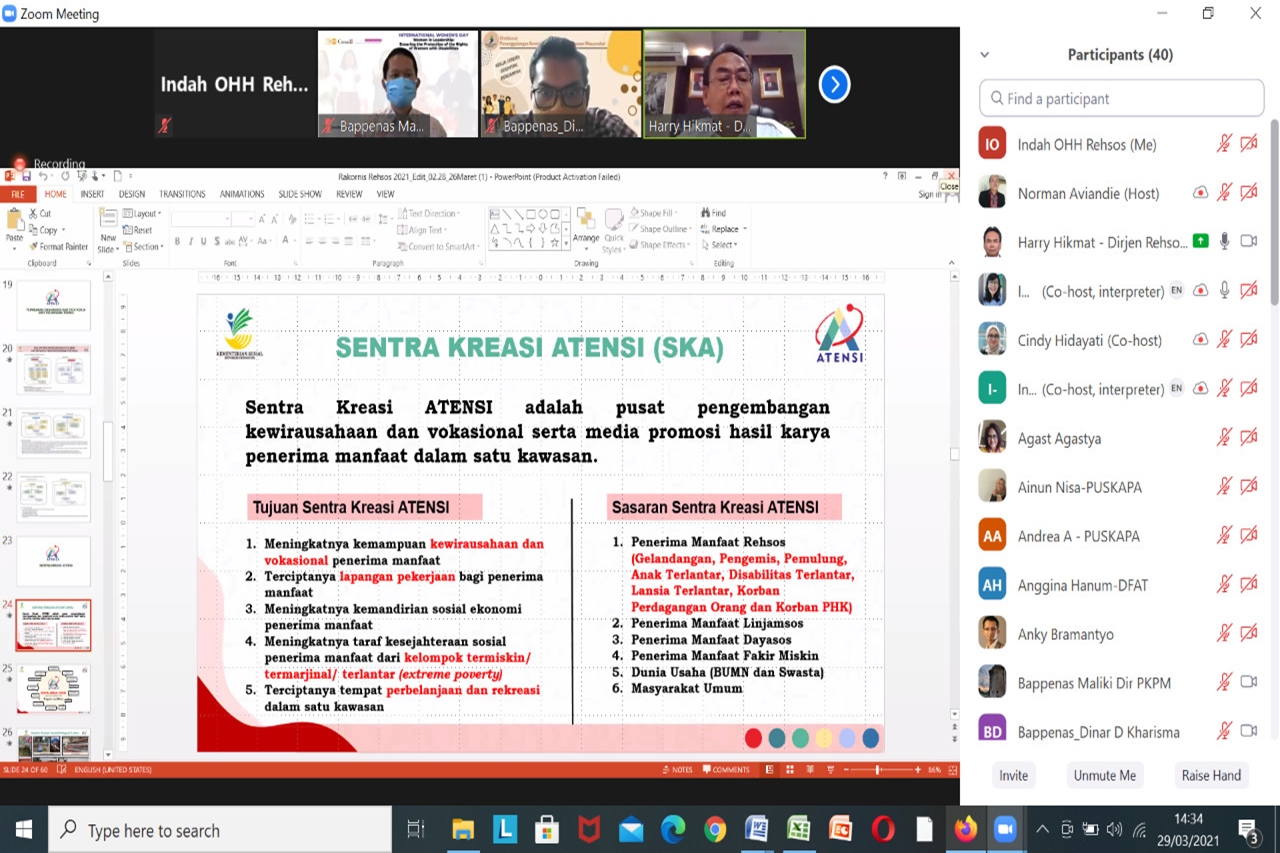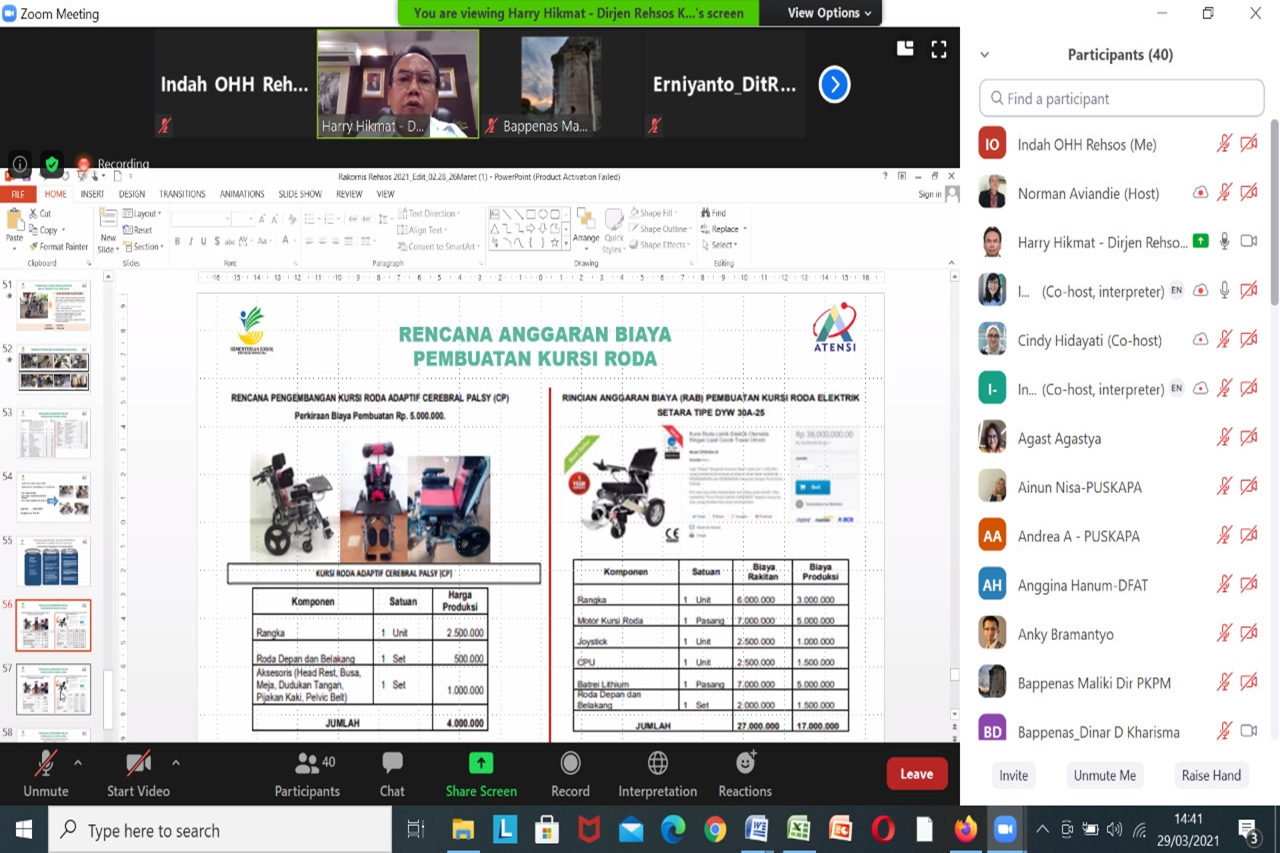Writer :
Humas Ditjen Rehabilitasi Sosial
Editor :
Intan Qonita N
Translator :
Intan Qonita N
JAKARTA (March 29, 2021) - Director General of Social Rehabilitation of the Indonesian Ministry of Social Affairs, Harry Hikmat, held virtual discussions with the National Development Planning Agency (Bappenas), MAHKOTA and the Center for Study and Advocacy for the Protection and Quality of Life of Children at the University of Indonesia (PUSKAPA) about program strengthening studies. Social Rehabilitation Assistance (ATENSI).
In accordance with the direction of the Minister of Social Affairs of the Republic of Indonesia, Tri Rismaharini, that social rehabilitation centers in Indonesia must have a multifunctional approach, which is being able to respond to all existing social problems and integrated with social protection and security programs, social empowerment and handling the poor. This is a business process concept from ATENSI.
To achieve this, the Ministry of Social Affairs has made various efforts since the leadership of Social Minister Risma, starting from refocusing the original budget for renovation, reviewing it and if it is not considered a priority, then it is transferred to services to beneficiaries. One example is refocusing the budget for the manufacture of electric wheelchairs and adaptive wheelchairs for people with cerebral palsy and hydrocephalus.
Harry said that the key point of Social Minister Risma's direction, apart from budget refocusing, was that social rehabilitation centers throughout Indonesia needed to develop the ATENSI Creation Center (SKA) which would become a place for job opportunities and job access to become an economic center for beneficiaries.
There are 2 ATENSI Creative Centers that have been inaugurated, namely the ATENSI Creation Center at the Pangudi Luhur Training Center in Bekasi and the ATENSI Creation Center at the "Kartini" Center for Disabilities, Temanggung.
Harry said that the various efforts made in principle require integrated services. Therefore, there will be a public complaint system that must be prepared by the Center through the Social Service Center (SERASI).
"This is a need that cannot be postponed. The center needs to implement ATENSI which is integrated with the Family Hope Program (PKH), Non-Cash Food Assistance Program (BPNT), Joint Business Group (KUBE) and other programs followed by an integrated service system in the form of SERASI," explained Harry.
Director of Poverty Reduction and Community Empowerment of Bappenas Maliki appreciated the Ministry of Social's quick steps in the form of ATENSI. Bappenas and the Ministry of Finance have approved the budget and work plan for the ATENSI program and in 2021 it will begin to be implemented.
In accordance with the direction of the Minister of Social Affairs of the Republic of Indonesia, Tri Rismaharini, that social rehabilitation centers in Indonesia must have a multifunctional approach, which is being able to respond to all existing social problems and integrated with social protection and security programs, social empowerment and handling the poor. This is a business process concept from ATENSI.
To achieve this, the Ministry of Social Affairs has made various efforts since the leadership of Social Minister Risma, starting from refocusing the original budget for renovation, reviewing it and if it is not considered a priority, then it is transferred to services to beneficiaries. One example is refocusing the budget for the manufacture of electric wheelchairs and adaptive wheelchairs for people with cerebral palsy and hydrocephalus.
Harry said that the key point of Social Minister Risma's direction, apart from budget refocusing, was that social rehabilitation centers throughout Indonesia needed to develop the ATENSI Creation Center (SKA) which would become a place for job opportunities and job access to become an economic center for beneficiaries.
There are 2 ATENSI Creative Centers that have been inaugurated, namely the ATENSI Creation Center at the Pangudi Luhur Training Center in Bekasi and the ATENSI Creation Center at the "Kartini" Center for Disabilities, Temanggung.
Harry said that the various efforts made in principle require integrated services. Therefore, there will be a public complaint system that must be prepared by the Center through the Social Service Center (SERASI).
"This is a need that cannot be postponed. The center needs to implement ATENSI which is integrated with the Family Hope Program (PKH), Non-Cash Food Assistance Program (BPNT), Joint Business Group (KUBE) and other programs followed by an integrated service system in the form of SERASI," explained Harry.
Director of Poverty Reduction and Community Empowerment of Bappenas Maliki appreciated the Ministry of Social's quick steps in the form of ATENSI. Bappenas and the Ministry of Finance have approved the budget and work plan for the ATENSI program and in 2021 it will begin to be implemented.
Bappenas tries to empower the referral system for social rehabilitation programs. Then the results of this social rehabilitation program can be channeled to other programs so that they can develop further. "We are trying to give direction to PUSKAPA that interlinks between programs must be strengthened," said Maliki.
Based on the urgency of ATENSI's future role in handling vulnerable groups such as children, the elderly, persons with disabilities, victims of drug abuse as well as socially disabled and victims of trafficking in persons, the Ministry of Social Affairs cooperates with Bappenas, MAHKOTA and PUSKAPA to carry out activities to strengthen the ATENSI program.
Santi Kusumaningrum, Deputy Director of PUSKAPA, said that a quick study of ATENSI as a concept towards a comprehensive social care and service system in Indonesia needs to be carried out immediately. This is because ATENSI has the potential to emphasize the importance of social services and care in addition to cash transfers or subsidies for vulnerable groups.
Santi explained that the main approach is comprehensive, comprehensive, risk and mitigation. This study will involve various sources from ATENSI implementers, namely social rehabilitation cluster representatives, referral stakeholders, planning stakeholders and beneficiaries.
This study on ATENSI was also supported by Social Protection and Labor Specialist Karishma Huda from MAHKOTA, which is the Department of Trade and Foreign Affairs in Australia which finances the national social protection policy program in Indonesia.
Karishma said that therapy to economic access were parts of an interesting program. MAHKOTA is very enthusiastic about the development of social standards at the Ministry of Social Affairs to be able to move forward, then supported by collaboration with the Directorate General of Social Affairs of the Ministry of Social Affairs and Bappenas to truly understand the needs of vulnerable groups.
Harry emphasized that Social Minister Risma always ordered to provide complete services. In the ATENSI framework, it can be seen from the Impact that will be produced, namely socioeconomic independence and increasing socio-economic welfare levels.
Based on the urgency of ATENSI's future role in handling vulnerable groups such as children, the elderly, persons with disabilities, victims of drug abuse as well as socially disabled and victims of trafficking in persons, the Ministry of Social Affairs cooperates with Bappenas, MAHKOTA and PUSKAPA to carry out activities to strengthen the ATENSI program.
Santi Kusumaningrum, Deputy Director of PUSKAPA, said that a quick study of ATENSI as a concept towards a comprehensive social care and service system in Indonesia needs to be carried out immediately. This is because ATENSI has the potential to emphasize the importance of social services and care in addition to cash transfers or subsidies for vulnerable groups.
Santi explained that the main approach is comprehensive, comprehensive, risk and mitigation. This study will involve various sources from ATENSI implementers, namely social rehabilitation cluster representatives, referral stakeholders, planning stakeholders and beneficiaries.
This study on ATENSI was also supported by Social Protection and Labor Specialist Karishma Huda from MAHKOTA, which is the Department of Trade and Foreign Affairs in Australia which finances the national social protection policy program in Indonesia.
Karishma said that therapy to economic access were parts of an interesting program. MAHKOTA is very enthusiastic about the development of social standards at the Ministry of Social Affairs to be able to move forward, then supported by collaboration with the Directorate General of Social Affairs of the Ministry of Social Affairs and Bappenas to truly understand the needs of vulnerable groups.
Harry emphasized that Social Minister Risma always ordered to provide complete services. In the ATENSI framework, it can be seen from the Impact that will be produced, namely socioeconomic independence and increasing socio-economic welfare levels.
Share :
 English
English
 Bahasa
Bahasa




